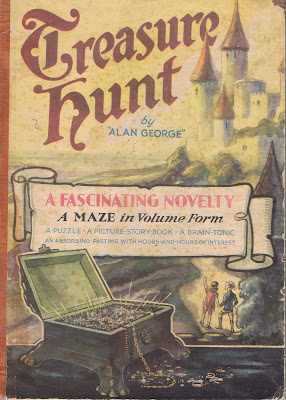Friday, 24 June 2022
Games that gloomviles play
Friday, 17 June 2022
A supernova imagination
You can probably see why I was immediately drawn to the work of Dublin-based artist Rory Björkman. There's a bit of a Mirabilis vibe in some of his pictures. But he has more strings to his bow that that, and I was mesmerized by this article about his art. (Full disclosure: it's by my wife.)
"Rory sees a lot of potential in games. 'I think they’re an underused platform. They could be used to a much greater extent for telling stories instead of shoot-up adventures. Games could tell great stories but you don’t see much of that.’"
Friday, 10 June 2022
No new thing under the sun
I knew gamebooks dated back much further than Choose Your Own Adventure and Steve Jackson's Melee and Wizard solo games. I used to play educational logic "gamebooks" back in the early 1960s. But it turns out that "Alan George"'s Treasure Hunt not only anticipated all that by a further two decades (it was published in 1940) but also sort of pioneered the graphic novel gamebook genre that I thought Russ Nicholson and I had invented in the early '80s.
Prior to that was Consider the Consequences, a gamebook of life choices, love, marriage and careers by Doris Webster and Mary Alden Hopkins, which came out in 1930 and is now available on the Internet Archive.
Much more up to date is a new(ish) open-world gamebook called Traquelero: A Quest for Happiness, by Othniel Poole. It seems pretty hard to get hold of, which is a shame as the concept sounds fascinating. No dice, no stats, just a character journey to explore. Effectively a walking sim in gamebook form? I'd like to try it and find out.
Thursday, 2 June 2022
Theme tune
John Whitbourn remarked to me not so long ago that it was a pity we had to drop the comments on this blog for a while, because without them a spark had gone. I know exactly what he means. One of the main reasons I was a Marvel rather than DC fan was the sense of community that Stan Lee brought to the former, and a big part of that came from the lively exchanges on the letters pages.
But even while comments here were shut down I was still getting some feedback -- some of it bubbling up out of the moronic inferno of social media, and other communications (much more civilized) in real life, in emails, and on my Patreon page. John Jones, gamebook expert, valued consigliere and frequent correspondent, made an interesting point about themes in books and roleplaying games. He was talking about how White Wolf's World of Darkness used settings to convey themes and moods, for example Detroit in the '90s, with its theme of decayed grandeur and loneliness. "Detroit," John went on to explain, "was a city built for two million that at that time had 400,000 people or so living in it."
We discussed the themes of the Vulcanverse books, and John made some interesting observations:
"The Houses of the Dead is a little rough because it was the first book, but even there I can see a theme/mood of indifference. Charon knows the living aren't supposed to be in Hades, but the gods are asleep, so what does it matter? The philosophers debate endlessly at their foodless dinner until your character provides the picnic hamper. One of the Fates will give your character a favour for... a honey cake, because why not?
"The Hammer of the Sun's general theme/mood seems to be withering. Without the waters of the rivers, Iskandria is little more than a largish village. The Amazons are basically a largish bandit gang. Even the Sphinxes of the pyramids mostly just slumber in the heat, too weakened or indifferent to guard their homes, for the most part. Heck, Loutro, who knows the rituals of Tethys, will only accompany the character, not actually do the rituals himself.
"The Wild Woods' theme seems to be ruin, whether through specific actions (suppressing the rivers) or just general neglect. The bridge-nets for the catapult travel system are in disrepair. Fort Blackgate is a ruin, home to a vile giant. The Summer Palace, home of a powerless king, is in bad shape. Even the Great Green Ones are slowly dying, just like the child of the truffle hunter who is unwittingly killing them."The Pillars of the Sky's theme seems to be isolation. One of the few surviving minotaurs roams his labyrinth alone. The bosgyns live away from their men. Stuck in their Great Sinkhole city the Gargareans dwell on their own perceived superiority, which allows them to brutally mistreat their captives and attack others as lesser beings. Even Boreas, the north wind himself, is isolated and trapped in a frozen moment of time by the Uroboros Ring."







